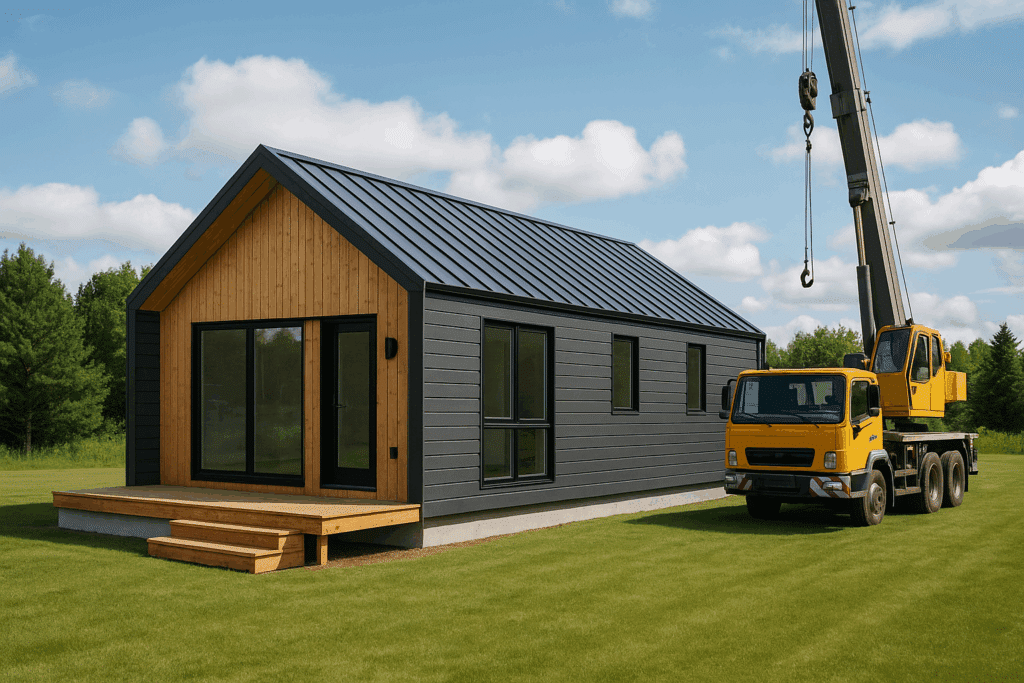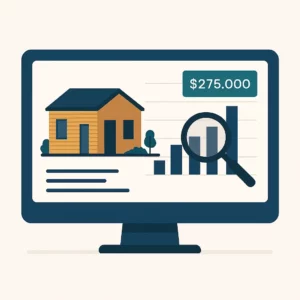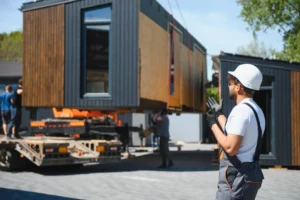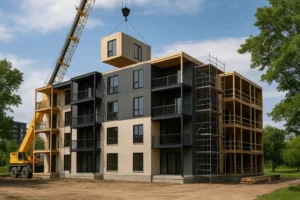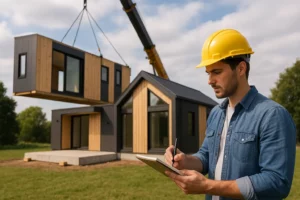There prefabricated house (Or factory-built house) is now a popular alternative for building one's dream home, particularly in Quebec.
Once perceived as a low-end choice, it now offers a quality of construction equivalent to the traditional method, thanks to factory processes guaranteeing precise results that comply with standards.
Among the advantages highlighted, the cost One major advantage remains: building a prefabricated house generally costs cheaper than a conventional on-site construction.
But in practical terms, what budget should be planned for a prefabricated house?
This article aims to answer this question in detail, explaining the pricing factors, presenting cost ranges in 2025 and providing advice to best plan your project.
Factors that influence the price of a prefabricated house
THE price of a prefabricated house can vary considerably from project to project.
Here are the main factors that cause the final cost of a manufactured home to fluctuate.
-
The chosen model and design: The type of house (bungalow, cottage, tiny house, luxury house, etc.) and the complexity of the architectural style influence the price. A high-end or highly customized model will cost more than a simpler, standard model.
-
Living area: The size of the house (number of square feet) is a determining factor – a larger house requires more materials and labor, which increases costs.
-
Number of pieces: The number of bedrooms and bathrooms affects the price, as it impacts the size of the house and the level of interior fittings (plumbing, electricity, finishes in each bathroom, etc.).
-
The level of interior and exterior finish: The quality of the finishes (flooring materials, cabinetry, appliances, etc.) and exterior materials (siding, roofing, windows) will have an impact. High-end options will increase the price.
-
The chosen manufacturer: Each prefabricated home manufacturer has its own price list. Reputable companies or those offering superior services may be more expensive. It is therefore worthwhile to compare prices.
-
Location and delivery: The installation region and the expected delivery date can influence costs. For example, building in a remote area can result in higher transportation costs, and site accessibility (ease of truck access, soil preparation) can add logistical costs.
-
Special arrangements: Adding an attached garage, a finished basement, a cathedral ceiling, energy-efficient equipment, or other custom options will increase the final price.
Each project is unique, and it there is no universal fixed price for a prefabricated house. It is therefore crucial to clearly define your needs and priorities, because These combined factors will determine the total cost.
Price ranges for prefabricated houses
Even though each project is unique, we can establish realistic price ranges to help better understand the market.
In 2026 in Quebec, a complete small prefabricated house is generally located between 250,000 $ and 350,000 $, while high-end models often exceed 500 000 $.
For mini-houses, you can find models around 150,000 to 200,000$.
For a turnkey home, we're talking more like 200,000$ for a house of approximately 700-800 square feet including 2 bedrooms and 1 bathroom.
Here is a simple and clear overview:
📊 Price table according to surface area and type of prefabricated house
| Type of prefabricated house | Typical area | Realistic total cost (2026) |
|---|---|---|
| Prefabricated mini-house | 600 to 800 sq ft | 150,000 $ to 250,000 $ |
| Small prefabricated house | 800 to 1,200 sq ft | 250,000 $ to 350,000 $ |
| Standard prefabricated house | 1,200 to 2,000 sq ft | 350,000 $ to 500,000 $ |
| High-end prefabricated house | 2,000 to 3,000 sq ft | 500,000 $ and more |
✔ These prices represent the usual total cost prefabricated modules, installation, foundation, basic connections and essential work to make the house habitable.
✔ The land is not included, because its cost varies enormously from one region to another.
🏡 What these prices include (and do not include)
The amounts above generally reflect:
-
Factory manufacturing
-
Transport and the crane
-
Assembly on your land
-
The foundation (slab or crawl space)
-
Essential connections (electricity, water, septic tank or sewer)
-
The basic finishes
They don't understand:
-
The purchase of the land (often 80,000 $ to 200,000 $ (or more depending on the region)
-
Professional fees (surveyor, permits, engineer, notary)
-
Landscaping
-
A margin for unforeseen events (recommended): 5 to 15 % of the budget)
🔍 Prefabricated mini-homes (600 to 800 sq ft)
Tiny houses have gained enormous popularity. However, their actual total cost is often underestimated. In 2026, we are more likely to see this range:
👉 150,000 $ to 250,000 $ all inclusive
These amounts include:
-
Prefabricated module
-
Crane + installation
-
Foundation or piles
-
Connections
-
Essential work to make the house habitable
Why is this amount higher than we think?
-
Tiny houses require the same equipment as a full house: kitchen, bathroom, plumbing, electricity, ventilation.
-
Fixed costs (foundation, connections, transport) are often similar to those of a larger house.
-
Several modern models are now highly finished, which increases the budget.
To see concrete examples:
➡️ https://collectionimmobiliere.com/mini-chalet-prefabrique/
Good to know
The category of prefabricated mini-houses It has become particularly popular in recent years because it allows people to become homeowners on a budget. Most tiny houses (often 200 to 500 square feet) sell for between 60,000 $ and 100,000 $ for the basic models. These small homes offer a minimalist lifestyle at a low cost.
However, some high-end or larger-sized mini-house models can reach much higher prices. For example, according to an analysis by the website Collection Immobilière, the price of a prefabricated mini-house in Quebec can vary from approximately 85,000 $ up to 350,000 $ depending on the model and options.
This illustrates how much prices can fluctuate even within the "tiny house" market – a fully equipped, turnkey model from a renowned builder could cost as much as an average-sized family home. Conversely, a standard, no-frills tiny house remains the most economical option on the market.
🏠 Small prefabricated houses (800 to 1,200 sq ft)
This is the most popular segment for first-time buyers.
In 2026, the total price is generally:
👉 250,000 $ to 350,000 $
These houses offer an excellent compromise between size, comfort and cost.
🏡 Standard prefabricated houses (1,200 to 2,000 sq ft)
This represents the majority of residential projects in Quebec.
👉 350,000 $ to 500,000 $
(depending on the finish, number of modules and architectural choices)
For the most affordable models:
➡️ https://collectionimmobiliere.com/maison-prefabriquee-10-moins-chers-avec-prix/
🏘️ High-end homes (2,000 to 3,000 sq ft)
These models offer:
-
complex architecture
-
Large windows
-
Superior materials
-
Almost complete factory finishing
👉 500,000 $ and more
They cater to a clientele seeking a higher level of finish and personalization.
For luxury but affordable models:
➡️ https://collectionimmobiliere.com/chalet-prefabrique-top-10-moins-cher-avec-prix/
Tips for estimating and optimizing your budget
While price ranges provide a general idea, it is essential to plan your budget carefully construction. Here are some tips to help you control the costs of your future prefabricated home and get the best value for money.
Compare offers from manufacturers
As with any major project, it is recommended to shop and compare offers.
Each prefabricated home manufacturer may offer different inclusions and prices.
Take the time to ask for detailed submissions with several specialist companies, describing your project as precisely as possible (size, style, desired level of finish, region of implantation, etc.).
By comparing several quotes, you can get a more accurate idea of the market price for your house and choose the most advantageous offer.
Moreover, experts advise that Compare the models and prices of several manufacturers before making your final choice.
This will not only save you money, but also allow you to assess the reputation and quality of each manufacturer (materials used, guarantees offered, lead times, after-sales service, etc.).
Don't hesitate to ask questions about what is included or not in the advertised price (for example, is the foundation included? Are the kitchen cabinets included?), in order to avoid surprises and make a proper comparison. at an equivalent level.
Use our online price simulator
To help you estimate your budget quickly and accurately, We provide you with a complete cost simulator For prefabricated homes in Quebec. In just a few seconds, you can get a realistic estimate by simply entering the basic parameters of your project.
Our tool automatically calculates the estimated total price according to :
-
the desired area,
-
the type of prefabrication (turnkey modular or kit),
-
the type of foundation,
-
the region,
-
and the essential elements of the construction site.
The simulator also breaks down each expense item — Excavation, foundations, installation, connections, finishing, unforeseen events, etc. — based on average standards in the Quebec market.
By adjusting the options (area, finish, project type), you obtain a custom price range for your prefabricated house or cottage.
Of course, these figures remain estimates, but they provide an excellent starting point for planning your budget before requesting quotes.
This tool is ideal for:
-
compare several scenarios,
-
visualize the impact of foundation or surface area choices,
-
test different levels of finish,
-
or prepare a realistic budget before meeting with a builder.
👉 Try it here:
https://collectionimmobiliere.com/simulateur-de-cout-pour-maison-prefabriquee/
Choose the option that suits you: turnkey or partial self-build
Prefabricated homes are offered in two main formulas, and your choice will have a direct impact on the final price.
The first one is the turnkey solution. In this case, the builder takes care of everything: plans, factory production, materials, labor, transport, installation… in short, you receive a move-in ready home. It's the simplest and most reassuring solution. It costs a little more, but it saves you the headaches, delays, and construction site coordination. For many people, that's a major advantage.
The other option is the kit formula or partial self-construction. The builder manufactures the shell of the house (walls, roof, structure), then it is up to you — or subcontractors of your choice — to do the rest: plumbing, electricity, interior finishing, painting, etc.
If you're handy or want to control your budget, this is an interesting option. You can save up to 30 % compared to a turnkey solution, which makes a big difference for a complete project.
However, we must be realistic: self-building requires time, organization, and a minimum level of expertise. Certain tasks absolutely must be carried out by professionals (such as electrical and plumbing work). And poor planning can quickly drive up costs.
In summary:
-
Turnkey → Peace of mind, everything is managed, higher price but no site management.
-
Kit / self-build → lower price, more freedom, but more responsibility and work.
Regardless of the option chosen, take the time to check thoroughly. what is included or not in the builder's contract. This is the key to avoiding surprises and planning your budget properly.
Anticipate additional costs (land, professional fees, taxes, etc.)
Finally, don't forget to include in your budget all additional costs related to the construction of your prefabricated house.
The price quoted by the manufacturer generally refers to the house itself, but other costs are added inevitably, to bring the project to fruition:
-
Land purchase: Unless you already own the land, you will need to purchase the lot on which to build the house. The price of the land depends on its location (rural or urban, with or without utilities, proximity to centers, etc.) and its size. As mentioned above, it can range from a few tens of thousands of dollars for a remote lot to over $200,000 in a desirable area.
-
Foundations and excavation: Site preparation (excavation, leveling) and foundation construction (concrete slab, crawl space, or basement) represent a significant cost that must be budgeted separately if the builder does not include it. Some builders offer this as an option, while others leave this aspect to the client to manage with a local contractor.
-
Connections and services: Installing utility connections (electricity, water, sewage or septic tank, telecommunications) and mechanical equipment (heating, ventilation) incurs additional costs. For example, connecting to municipal services or installing a well and septic tank, depending on the circumstances, can cost several thousand dollars, which must be anticipated.
-
Professional expenses and permits: Don't overlook administrative costs. It may be necessary to hire an architect or engineer to adapt the plans to local codes or for inspections (especially if you are modifying the manufacturer's standard plan). A land surveyor may be required to stake out the house on the lot. There are also the building permit and other municipal permits, the cost of which varies from city to city. All these additional items are part of the overall budget.
-
Legal fees and taxes: The involvement of a notary will be essential to formalize the purchase of the land and, potentially, to mortgage the prefabricated house. Also plan for the welcome tax (Transfer tax) payable to the municipality upon acquisition of the land. And of course, let's not forget the sales taxes (GST/QST) that apply to the prefabricated house itself – they are normally included in the prices advertised by builders to the consumer client, but it's good to confirm.
-
Exterior arrangements and unforeseen events: After construction, you will likely want to do the landscaping (entrance, patio, lawn, etc.) – these are expenses to plan for within a year of construction. Also, keep a buffer for the unforeseen events is always wise (for example, soils more difficult to excavate than expected, last-minute adjustments, etc.). A general rule is to plan for a reserve of at least 5 to 15 % of the budget to cover unforeseen events.
In short, prepare an overall budget which includes not only the prefabricated house itself, but also all of these related costs.
🧾 Conclusion: How much does a prefabricated house really cost?
Ultimately, it does not exist one price for a prefabricated house, but well cost ranges which vary according to the surface area, the level of finish, the type of prefabrication, the region and the work to be carried out around the house.
In 2026, it can be summarized as follows:
-
THE tiny houses rotate between 150,000 $ and 250,000 $ (total cost, excluding land).
-
THE small prefabricated houses are located around 250,000 $ to 350,000 $.
-
THE standard houses are generally between 350,000 $ and 500,000 $.
-
THE high-end projects begin to 500 000 $ and can go far beyond that, depending on the level of personalization.
The important thing is to build a budget that is consistent with your reality Your income, your lifestyle, your region, and your tolerance for unforeseen events all play a role. A well-planned prefabricated home can offer excellent value for money, while reducing the time and risks associated with traditional construction.
To move from theory to your specific case, you can use our tool:
👉 Get an estimate tailored to your surface area, foundation type, and region:
https://collectionimmobiliere.com/simulateur-de-cout-pour-maison-prefabriquee/
We hope this guide helps you understand better the true price of a prefabricated house in Quebec and to make informed choices for the continuation of your project.
